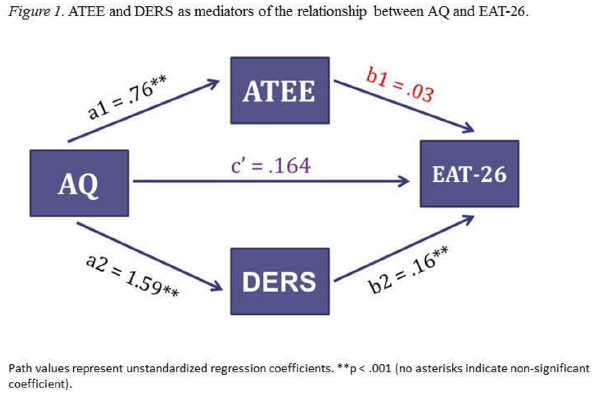No CrossRef data available.
Published online by Cambridge University Press: 15 April 2020
An overlap between Eating Disorders (EDs) and Autism Spectrum Disorder (ASD) has been proposed based on clinical and behavioural observations. No research to date has however assessed the potential mechanisms linking the two disorder sets.
To assess the extent of overlap in levels of eating pathology and ASD traits and to explore potential mechanisms linking the two disorder sets by assessing the mediating effects of negative attitudes towards emotions and emotion dysregulation.
401 university students (82.8% females), filled in an online questionnaire including the following measures: the Eating Attitudes Test (EAT-26), the Autism Spectrum Quotient (AQ), the Empathy Quotient (EQ), the Systemising Quotient (SQ), the Attitudes towards Emotional Expression Scale (ATEE), and the Difficulties in Emotion Regulation Scale (DERS).
With, the exception of Empathy and Systemising, all other ASD traits were positively related to ED symptoms (p<0.05). Multiple mediation analyses indicated that: (1) in combination, DERS and ATEE, provided full mediation of the effect of AQ on EAT-26, but (2) only DERS was a significant mediator of this direct relationship (See Figure 1).
The association between EDs and ASD that has been identified in clinical samples extends into non-clinical samples. The mediation analyses results suggest that the mechanism linking the two symptom clusters is difficulty in emotion regulation rather than difficulties expressing emotion.

Comments
No Comments have been published for this article.